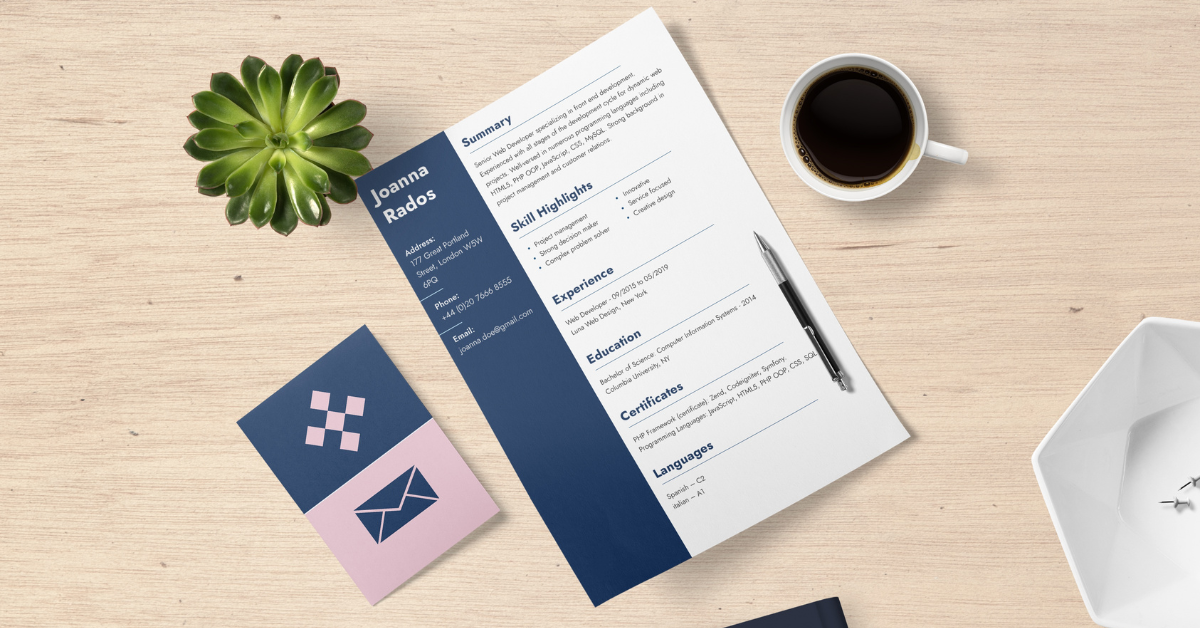
What Freshers Need to Know About CV Formatting
When starting your job search, especially as a fresher, the first step is creating a strong and appealing CV. It's not just about listing your education or internships; it's about presenting your skills in a way that grabs the recruiter’s attention. While CV formatting for experienced professionals may differ in complexity, as a fresher, you need to focus on presenting your strengths simply yet effectively. Knowing the right CV format for freshers is critical for ensuring that your application stands out in a competitive market. Crafting an impressive CV isn't hard if you follow some basic rules. This guide will help you avoid common CV mistakes and provide essential fresher CV tips to make your document more professional and effective.
Why is CV Formatting Important?
A CV, or curriculum vitae, is your first impression of potential employers. Think of it as your personal marketing tool—it represents you even before you can speak. The right format for a CV ensures that your information is presented concisely and professionally. Employers often scan CVs, so having a well-organized and easy-to-read format is crucial to ensure they get the essential details at a glance. Although CV formatting for experienced applicants tends to involve more advanced sections like extensive job history, freshers should focus on clarity and relevance.
The Right CV Format for Freshers
When it comes to CV format for freshers, simplicity and clarity are key. You don’t need fancy designs or complicated layouts; what you need is a format that allows your strengths and achievements to shine. Here's a basic structure:
- Contact Information
Add your complete name, contact information (phone and email), and, if you have one, your LinkedIn profile. Make sure this section is neat and at the top of the page. - Objective or Personal Statement
This is a brief introduction (2-3 lines) where you summarize your career goals and explain why you are applying for the job. Adjust this to the position you're applying for specifically. - Education
As a fresher, your education section will likely be one of the most important parts of your CV. List your highest qualification first and include any relevant coursework, honors, or achievements. - Skills
Highlight key skills relevant to the job. As a fresher, this might include technical skills like proficiency in software, languages, or soft skills like communication or teamwork. - Internships or Volunteer Experience
Even if you don’t have formal job experience, mention any internships, volunteer work, or extracurricular activities that showcase your capabilities. This section allows you to demonstrate initiative and learning outside the classroom. - Certifications or Courses
If you've taken any online courses or certifications relevant to the job, include them here. They show that you are committed to self-improvement and professional development. - Hobbies and Interests
Though optional, this section gives the employer a little insight into your personality and may help break the ice during interviews.
Common CV Mistakes to Avoid
Many freshers make errors in their CVs that can easily be avoided. Here are three common CV mistakes and how to avoid them:
- Overloading Information: One of the most common CV mistakes is trying to cram too much information into one page. Stick to the relevant facts, and remember that less is often more.
- Spelling and Grammar Errors: Even a small spelling or grammar mistake can make your CV look unprofessional. Always proofread your document and use tools like Grammarly or ask someone else to review it.
- Poor Layout and Formatting: Recruiters appreciate clear and well-organized CVs. Avoid cluttered layouts, inconsistent fonts, or too many different headings. For freshers, following the basic CV format is crucial, while CV formatting for experienced professionals can involve more sections like achievements.
Fresher CV Tips for Creating a Professional CV
Now that you know some common CV mistakes, let’s focus on practical fresher CV tips to make your CV stand out:
- Customize Your Resume for Every Job Application
One of the best fresher CV tips is to customize your CV for every job you apply for. Don’t send the same resume to every employer. Review the job description and tailor your skills, experience, and objective statement accordingly. - Keep It Concise
As a fresher, your CV should ideally be one page. Focus on highlighting the most relevant information. A concise CV shows that you can communicate effectively and prioritize essential information. - Use Action Words
When describing your internships or projects, use action verbs such as "led," "created," or "organized." For example, instead of saying "I was responsible for a project," say "I led a project."
Formatting for Readability
One key aspect of any format for a CV is readability. Stick to the following guidelines to ensure your CV is easy on the eyes:
- Font Choice: Use a professional font like Arial or Times New Roman, 10-12 points for body text, and 14-16 points for section headings.
- Bullet Points: Break down your skills and experiences with bullet points to make them easy to scan.
- Margins and White Space: Leave adequate white space between sections for a cleaner look.
The Importance of Keywords
Many companies now use applicant tracking systems (ATS) to filter CVs before a human even sees them. Incorporating job-related keywords is crucial. For example, if the job description mentions specific skills like "data analysis" or "customer service," be sure to include these in your CV. This is particularly important for both freshers and those familiar with CV formatting for experienced professionals.
Final Thoughts on CV Format for Freshers
Crafting the perfect CV format for freshers may seem daunting at first, but by avoiding common CV mistakes and following these fresher CV tips, you can create a CV that highlights your strengths and potential. Always remember that your CV is a living document—it should evolve with your experiences and skills. When it comes to standing out as a fresher, your CV is your best tool. Use it wisely, follow a clear and professional format, and you’ll be well on your way to landing that first job





